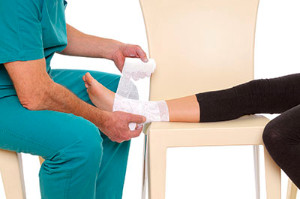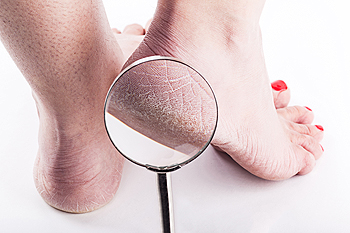North Andover (978) 686-7623
Tewksbury (978) 640-1010
Featured
January 2020
 Neuropathy is a condition that affects the feet, specifically causing them to lose feeling. This can be incredibly dangerous, especially if you have developed a serious foot condition and can not feel the symptoms of it. Neuropathy may also alter the shape of your foot. Your arch may be raised, your toes can begin to bend downward, and the bones at the ball of your foot may protrude outward. When the shape of the foot changes, it in turn changes its overall function as well. To keep your feet comfortable, you may want to look into wearing shoes with extra support. Other signs that indicate you may have developed neuropathy include sensations of numbness, stinging, burning, and stabbing aches and pains. Hypersensitivity, as well as dry or cracked skin may develop due to neuropathy. In order to receive a proper diagnosis, and a suggested plan for treatment, we recommend you consult with a podiatrist for professional care.
Neuropathy is a condition that affects the feet, specifically causing them to lose feeling. This can be incredibly dangerous, especially if you have developed a serious foot condition and can not feel the symptoms of it. Neuropathy may also alter the shape of your foot. Your arch may be raised, your toes can begin to bend downward, and the bones at the ball of your foot may protrude outward. When the shape of the foot changes, it in turn changes its overall function as well. To keep your feet comfortable, you may want to look into wearing shoes with extra support. Other signs that indicate you may have developed neuropathy include sensations of numbness, stinging, burning, and stabbing aches and pains. Hypersensitivity, as well as dry or cracked skin may develop due to neuropathy. In order to receive a proper diagnosis, and a suggested plan for treatment, we recommend you consult with a podiatrist for professional care.
Neuropathy
Neuropathy can be a potentially serious condition, especially if it is left undiagnosed. If you have any concerns that you may be experiencing nerve loss in your feet, consult with one of our podiatrists from Foot Health Center of Merrimack Valley. Our doctors will assess your condition and provide you with quality foot and ankle treatment for neuropathy.
What Is Neuropathy?
Neuropathy is a condition that leads to damage to the nerves in the body. Peripheral neuropathy, or neuropathy that affects your peripheral nervous system, usually occurs in the feet. Neuropathy can be triggered by a number of different causes. Such causes include diabetes, infections, cancers, disorders, and toxic substances.
Symptoms of Neuropathy Include:
- Numbness
- Sensation loss
- Prickling and tingling sensations
- Throbbing, freezing, burning pains
- Muscle weakness
Those with diabetes are at serious risk due to being unable to feel an ulcer on their feet. Diabetics usually also suffer from poor blood circulation. This can lead to the wound not healing, infections occurring, and the limb may have to be amputated.
Treatment
To treat neuropathy in the foot, podiatrists will first diagnose the cause of the neuropathy. Figuring out the underlying cause of the neuropathy will allow the podiatrist to prescribe the best treatment, whether it be caused by diabetes, toxic substance exposure, infection, etc. If the nerve has not died, then it’s possible that sensation may be able to return to the foot.
Pain medication may be issued for pain. Electrical nerve stimulation can be used to stimulate nerves. If the neuropathy is caused from pressure on the nerves, then surgery may be necessary.
If you have any questions, please feel free to contact one of our offices located in North Andover, and Tewksbury, MA . We offer the newest diagnostic and treatment technologies for all your foot care needs.
 If you have endured an ankle sprain, it may have happened as a result of suddenly rolling your ankle. This can occur from stepping off of a curb unexpectedly, or from tripping on an unseen object. An eversion sprain generally targets the inner part of the ankle, and may affect the arch of the foot. If the ankle rolls outward, it is known as an inversion sprain, and may cause the ligaments to stretch or tear. There are common symptoms that are associated with ankle sprains. These can include severe pain and discomfort, swelling, and it may be difficult to move or bend the ankle. Moderate relief can be found if the affected foot is taped with an elastic bandage, and this may help to provide the support that is needed as the healing process takes place. If you have sprained your ankle, it is strongly suggested that you seek the counsel of a podiatrist who can guide you toward the correct treatment.
If you have endured an ankle sprain, it may have happened as a result of suddenly rolling your ankle. This can occur from stepping off of a curb unexpectedly, or from tripping on an unseen object. An eversion sprain generally targets the inner part of the ankle, and may affect the arch of the foot. If the ankle rolls outward, it is known as an inversion sprain, and may cause the ligaments to stretch or tear. There are common symptoms that are associated with ankle sprains. These can include severe pain and discomfort, swelling, and it may be difficult to move or bend the ankle. Moderate relief can be found if the affected foot is taped with an elastic bandage, and this may help to provide the support that is needed as the healing process takes place. If you have sprained your ankle, it is strongly suggested that you seek the counsel of a podiatrist who can guide you toward the correct treatment.
Ankle sprains are common but need immediate attention. If you need your feet checked, contact one of our podiatrists from Foot Health Center of Merrimack Valley. Our doctors can provide the care you need to keep you pain-free and on your feet.
How Does an Ankle Sprain Occur?
Ankle sprains take place when the ligaments in your ankle are torn or stretched beyond their limits. There are multiple ways that the ankle can become injured, including twisting or rolling over onto your ankle, putting undue stress on it, or causing trauma to the ankle itself.
What Are the Symptoms?
- Mild to moderate bruising
- Limited mobility
- Swelling
- Discoloration of the skin (depending on severity)
Preventing a Sprain
- Wearing appropriate shoes for the occasion
- Stretching before exercises and sports
- Knowing your limits
Treatment of a Sprain
Treatment of a sprain depends on the severity. Many times, people are told to rest and remain off their feet completely, while others are given an air cast. If the sprain is very severe, surgery may be required.
If you have suffered an ankle sprain previously, you may want to consider additional support such as a brace and regular exercises to strengthen the ankle.
If you have any questions please feel free to contact one of our offices located in North Andover, and Tewksbury, MA . We offer the newest diagnostic and treatment technologies for all your foot and ankle needs.
 Severe cases of the condition known as cracked heels can cause extreme pain and discomfort. They are deep cracks in the skin that are known as fissures, and generally occur on the outside of the heel. It is an ailment that develops gradually, and will be manageable with prompt treatment. Some of the symptoms of cracked heels can include flaky and peeling skin, hardened and red skin, and the area may itch. Common causes of this condition can consist of standing for extended periods of time throughout the day, and wearing shoes that do not fit correctly. Additionally, certain medical conditions such as psoriasis and thyroid disease may play a significant role in developing cracked heels. Relief may be temporarily felt when a good moisturizer is applied to the affected area. If you would like more information about how to treat and prevent cracked heels from developing, it is suggested that you speak to a podiatrist.
Severe cases of the condition known as cracked heels can cause extreme pain and discomfort. They are deep cracks in the skin that are known as fissures, and generally occur on the outside of the heel. It is an ailment that develops gradually, and will be manageable with prompt treatment. Some of the symptoms of cracked heels can include flaky and peeling skin, hardened and red skin, and the area may itch. Common causes of this condition can consist of standing for extended periods of time throughout the day, and wearing shoes that do not fit correctly. Additionally, certain medical conditions such as psoriasis and thyroid disease may play a significant role in developing cracked heels. Relief may be temporarily felt when a good moisturizer is applied to the affected area. If you would like more information about how to treat and prevent cracked heels from developing, it is suggested that you speak to a podiatrist.
If the skin on your feet starts to crack, you may want to see a podiatrist to find treatment. If you have any concerns, contact one of our podiatrists from Foot Health Center of Merrimack Valley. Our doctors can provide the care you need to keep you pain-free and on your feet.
Cracked Heels
It is important to moisturize your cracked heels in order to prevent pain, bleeding, and infection. The reason cracked heels form is because the skin on the foot is too dry to support the immense pressure placed on them. When the foot expands, the dry skin on the foot begins to split.
Ways to Help Heal Them
- Invest in a good foot cream
- Try Using Petroleum Jelly
- Ease up on Soaps
- Drink Plenty of Water
Ways to Prevent Cracked Heels
- Moisturize After Showering
- Skip a Shower
- Keep Shower Water Lukewarm
- Don’t Scrub Your Feet
If you are unsure how to proceed in treating cracked heels, seek guidance from a podiatrist. Your doctor will help you with any questions or information you may need.
If you have any questions, please feel free to contact one of our offices located in North Andover, and Tewksbury, MA . We offer the newest diagnostic and treatment technologies for all your foot care needs.
 There are many reasons why ankle pain may exist. It is considered to be a common injury, and the type of ankle pain can range from a severe sprain to a broken ankle. It can occur as a result of suddenly stepping off of a curb and twisting the ankle, or from participating in certain sporting activities. The tendons in the ankle help to make it possible to walk and run, and if these become torn or stretched, severe pain and discomfort may occur. Once a proper diagnosis is performed, the correct treatment can begin. Moderate relief may be found when the affected ankle is elevated, which may help to alleviate existing swelling. When the ankle is wrapped in an elastic bandage, the foot may feel adequately supported. If you have fallen and your ankle is affected, please speak with a podiatrist who can guide you toward proper healing treatments.
There are many reasons why ankle pain may exist. It is considered to be a common injury, and the type of ankle pain can range from a severe sprain to a broken ankle. It can occur as a result of suddenly stepping off of a curb and twisting the ankle, or from participating in certain sporting activities. The tendons in the ankle help to make it possible to walk and run, and if these become torn or stretched, severe pain and discomfort may occur. Once a proper diagnosis is performed, the correct treatment can begin. Moderate relief may be found when the affected ankle is elevated, which may help to alleviate existing swelling. When the ankle is wrapped in an elastic bandage, the foot may feel adequately supported. If you have fallen and your ankle is affected, please speak with a podiatrist who can guide you toward proper healing treatments.
Foot and ankle trauma is common among athletes and the elderly. If you have concerns that you may have experienced trauma to the foot and ankle, consult with one of our podiatrists from Foot Health Center of Merrimack Valley. Our doctors will assess your condition and provide you with quality foot and ankle treatment.
Foot and ankle trauma cover a range of injuries all over the foot; common injuries include:
- Broken bones
- Muscle strains
- Injuries to the tendons and ligaments
- Stress fractures
Symptoms
Symptoms of foot and ankle injuries vary depending on the injury, but more common ones include:
- Bruising
- Inflammation/ Swelling
- Pain
Diagnosis
To properly diagnose the exact type of injury, podiatrists will conduct a number of different tests. Some of these include sensation and visual tests, X-rays, and MRIs. Medical and family histories will also be taken into account.
Treatment
Once the injury has been diagnosed, the podiatrist can than offer the best treatment options for you. In less severe cases, rest and keeping pressure off the foot may be all that’s necessary. Orthotics, such as a specially made shoes, or immobilization devices, like splints or casts, may be deemed necessary. Finally, if the injury is severe enough, surgery may be necessary.
If you have any questions, please feel free to contact one of our offices located in North Andover, and Tewksbury, MA . We offer the newest diagnostic and treatment technologies for all your foot care needs.
Blog Archives
- 2024
- 2023
- 2022
- 2021
- 2020
- 2019
- 2018







